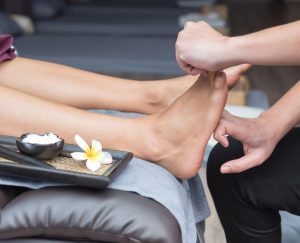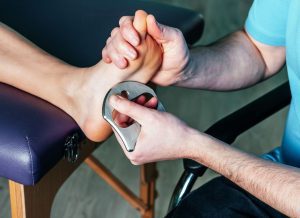To become an osteopath involves specific education, clinical training, and professional registration. Osteopaths diagnose, treat, and prevent musculoskeletal system diseases using non-invasive means such as manual therapy, manipulation, stretching, and massage. The aim is to increase the body’s functionality, flexibility and overall wellbeing. Working as an osteopath can be rewarding if you are passionate about all-natural medicine, manual therapy, and improving people’s lives. Here, you’ll find the how-tos, what you need to know to become an osteopath in the UK, and some tips on setting up a successful practice.
What Does an Osteopath Do?
To become an osteopath, you examine, diagnose and cure all muscle, joint and spinal illnesses with their hands. Their responsibilities include:
- Examining and Treating Musculoskeletal Disorders: To become an osteopath, you conduct physical examinations for tension, pain and imbalance. They survey patients for symptoms, medical history, and lifestyle and visually and physically examine patients to diagnose pain or dysfunction.
- Creating Customised Treatment Plans: Based on their findings, osteopaths develop specific treatment plans that can help ease pain, reduce mobility, and restore balance to the body. These plans can include manual therapy, exercise, and lifestyle guidance combined.
- Offering Manual Therapy & Manipulation: To become an osteopath, you use manual tools such as stretching, massage, joint manipulation, and muscle energy to promote healing, enhance blood flow, relax, and enhance muscle function.
- Preventive and Natural Health Information: To become an osteopath, you focus on total wellness. They suggest posture, exercise, ergonomics, diet and stress reduction techniques to prevent future damage and optimise health.
- Been Tracking the Development of Patients & Adjusting Therapy: To become an osteopath, you follow patients’ development over time and change their treatment accordingly to get the best results. The therapists see patients for several sessions to work on their recovery and future health.
- Partnering with Other Healthcare Providers: To become an osteopath, you might partner with GPs, physiotherapists, chiropractors, or other healthcare professionals to provide full-service care for complex patients.
Average UK Osteopath Pay Salary.
An osteopath’s UK salary depends on experience, geography and practice form. The average starting salary for newly qualified osteopaths is £20,000 to £35,000 a year during their early days of practice.
Osteopaths can make between £40,000 and £60,000 – depending on experience, patient list and specialisation. Working in your successful private practice or clinic, often in popular locations, can make more than £80,000 per year. Salary can vary depending on the number of patients seen, treatments provided, and the environment.
The Essential Qualities of An Osteopath
It involves clinical expertise, manual therapy and holistic insight. Key skills include:
- Anatomy and Physiology Basic: To become an osteopath, you require a fundamental knowledge of the human body – anatomy, physiology, biomechanics, and musculoskeletal function. This understanding is what enables you to correctly diagnose problems and treat them.
- Manual Dexterity and Physical Skills: To become an osteopath, you measure and treat with their hands, so manual agility, balance and strength are essential. It is important to perform exact manipulations and have correct posture when treating patients.
- Good Communication and Interpersonal Ability: It is important to establish a relationship with patients to discover their concerns, explain things to them, and assure them. Good interpersonal skills also enable trust and patients to follow treatment protocols.
- Problem Solving and Critical Thinking: To become an osteopath, you must diagnose intricate musculoskeletal problems, pinpoint pain-causing causes, and formulate individualised plans. Problem-solving abilities are vital for accurate diagnosis and successful treatment.
- Companionship and Loving Care: To become an osteopath, you spend time with painful or discomforting patients. Being sympathetic and providing loving and supportive support makes for a positive patient experience and facilitates recovery.
- Business & Marketing Knowledge (for Private Practice): Most osteopaths practice privately, and it pays to have business knowledge and marketing. Understanding practice management, patient acquisition, financials, and client acquisition is the key to a successful practice.
- Flexibility and CPD: To become an osteopath is still a growing discipline with ongoing research and developments. To ensure a high level of practice, it’s essential that you are up for exploring new treatment approaches, keeping up to date with industry trends, and attending CPD events.

How to be an Osteopath in the UK.
Becoming an osteopath involves specific education, clinical training, and professional registration. Here’s a step-by-step guide:
- Obtain a Recognized Degree in Osteopathy: To become an osteopath in the UK, you must complete a degree in osteopathy that is recognized by the General Osteopathic Council (GOsC). These degrees include:
- Bachelor of Osteopathy (BOst)
- Master of Osteopathy (MOst)
- Bachelor of Science (BSc) in Osteopathy
These courses typically take four to five years of full-time study (or part-time equivalent) and cover subjects such as anatomy, physiology, biomechanics, diagnostic techniques, manual therapy, and clinical practice. The programs also include supervised clinical placements to gain hands-on experience working with patients.
- Gain Practical Experience and Clinical Skills: During your degree program, you’ll spend significant time in a clinical setting under supervision. This hands-on experience is crucial for developing your diagnostic, manual therapy, and patient care skills. You will learn to assess patients, create treatment plans, and provide osteopathic care.
- Register with the General Osteopathic Council (GOsC): Upon completing your osteopathy degree, you must register with the General Osteopathic Council (GOsC) to legally practice as an osteopath in the UK. GOsC registration ensures that you meet the professional standards for safety, ethics, and clinical competency. To register, you must:
- Hold a recognized degree in osteopathy
- Complete the GOsC application process
- Pass a character assessment and health declaration
- Get Registered: Registration must be renewed annually, and you are required to engage in Continuing Professional Development (CPD) to maintain and enhance your skills.
- Seek Employment or Start Your Own Practice: Once registered, you can seek employment as an osteopath in various settings, such as:
- Private osteopathic clinics or practices
- Multidisciplinary healthcare centers
- Sports and rehabilitation clinics
- NHS community health centers (though NHS opportunities are limited)
- Private Practice: Many osteopaths choose to work in private practice due to greater flexibility, earning potential, and the opportunity to build their own client base. You can work as an associate osteopath in an established practice or set up your own practice if you have the business skills and resources.
- Develop and Expand Your Skills and Specializations: As you gain experience, you may choose to specialize in specific areas of osteopathy, such as:
- Sports injuries and rehabilitation
- Paediatric osteopathy
- Geriatric care and mobility
- Workplace ergonomics and occupational health
- Specialize: Specializing allows you to attract a targeted patient base and offer advanced care. Attending workshops, courses, and seminars on these topics can help you develop specialized skills.
- Engage in Continuing Professional Development (CPD): To become an osteopath, it is important to stay updated on the latest techniques, research, and best practices in osteopathy. Engage in CPD activities such as attending conferences, completing online courses, participating in peer reviews, and reading industry journals. This ensures you provide the highest quality of care and maintain your GOsC registration.

Pro Tip for Future Osteopaths.
- Get Some Real-Life Experience Right Away: If you can, volunteer for or shadow osteopaths in the clinic. Working in a medical or sports setting can also help students learn about musculoskeletal health.
- Establish a Solid Background in Human Biology and Disease: To become an osteopath requires solid knowledge of the body’s biology. The biology, anatomy and health sciences you study at the secondary level will allow you to obtain your degree in osteopathy.
- Good Communication and Patient-Care Competencies: To make connections with patients, you need to be approachable, a good listener, and an empathic person. Do your best to communicate about health conditions, offer support, and set up an environment for healing.
- Keep Fit and Maintain Your Health: Since osteopaths do manual therapy and often stand or walk around, keeping yourself healthy and fit is crucial to ensuring your business continues and you continue to treat people effectively.
- Connect and Join Professional Groups: Networking with other osteopaths, medical practitioners, and professional organisations such as the Institute of Osteopathy (iO) will connect you with resources and employment opportunities and keep you informed of emerging developments.
Frequently Asked Questions
Why You Need to Become an Osteopath?
Getting an osteopath degree provides an opportunity to enhance one’s life by reducing pain, suffering, and movement problems. It is an excellent profession if you like manual labour and natural health care, and it is rewarding to see patients get healthier and stronger physically.
Should You Make a Career In Osteopathy?
Osteopathy is your job if you are into anatomy, integrative medicine, and working alongside patients to treat them well. It can be scientifically studied with therapeutic techniques, allowing for an alternative health and wellness approach. An osteopath can also work from home, specialise, and be a self-employed practitioner.
How Much Can Osteopaths Earn in the UK?
New osteopaths can expect a salary from £20,000 to £35,000 annually. As you get more experience, establish your clients, and perhaps specialise, you can make between £40,000 and £60,000 or more. You can earn more than £80,000 a year in private practice, depending on where you are based.
What Qualifications are Required for a Career in Osteopathy?
To be an osteopath, you must have a Bachelor’s (BOst) or Master’s (MOst) in Osteopathy or an equivalent GOsC-validated degree. The class consists of didactic and clinical learning. When you complete your degree, you must apply to the General Osteopathic Council (GOsC) to practise in the UK.
What Skills Do You Need to Become an Osteopath?
You don’t need prior experience to start your degree in osteopathy. Still, you can get some experience in healthcare, physical therapy, sports therapy, or even shadowing an osteopath to understand what the career looks like. This exposure can enhance your knowledge in the discipline and give you a foundational experience in patient care.
What is the Future of Osteopathy?
There is still a huge demand for osteopathic treatment in the UK, with consumers becoming increasingly discerning about natural and holistic ways of health, pain and musculoskeletal treatment. There are jobs in private practice, multi-disciplinary clinics, sports medicine and community health clinics, where osteopaths have good career prospects and development potential.
What Are the Career Paths for Osteopaths?
An osteopath can develop more skills and specialisations in their job. You can decide to specialise in specific populations of patients, such as children, athletes or the elderly, or be a specialist in a health area, such as sports therapy, women’s health or ergonomics. Many osteopaths continue to practice, teach or research.
What’s Exit Options & Exit Opportunities Outside Osteopathy?
A skill mastered as an osteopath (such as manual therapy, care, anatomy and holistic care) will carry over to other medical professions. You might switch to physiotherapy, sports therapy, health coaching, massage therapy or even chiropractic care. Others go on to healthcare administration, consultancy or teaching positions in osteopathic schools.



